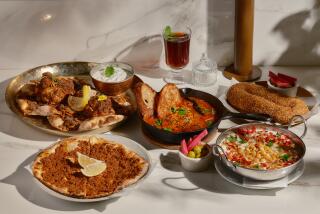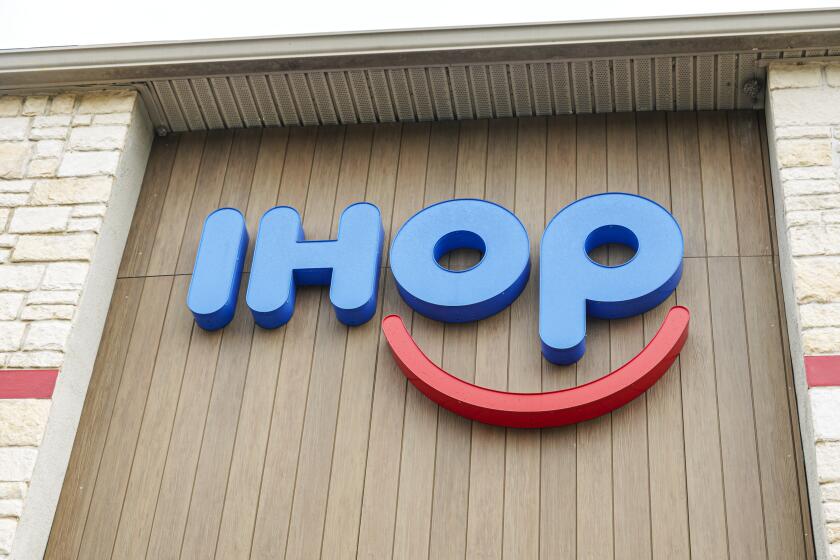Napa’s go-to virtuoso
BY the time Philippe Melka walks through the doors at 9:15 a.m. at Vineyard 29, he’s already received about 20 phone calls and answered 10. He used to not answer his phone, hoping to return calls when he had a free moment, but lately those moments aren’t easy to come by.
Melka is probably the most famous winemaker you’ve never heard of in California. Fifteen years ago, he moved here from Bordeaux to serve on the production team of Dominus, the Napa winery owned and operated by his fellow Bordelais, the Moueix family. Since then he has consulted for more than 15 California wineries, including some of the most rarified names in the cult category, with past clients including Lail, Constant, Caldwell and Seavey, and current clients such as Bryant Family, Vineyard 29, Marston Family and Dalla Valle, as well as his own label, Melka Wines.
For the record:
12:00 a.m. July 12, 2006 For The Record
Los Angeles Times Wednesday July 12, 2006 Home Edition Main News Part A Page 2 National Desk 0 inches; 27 words Type of Material: Correction
Winemaker: An article in the June 21 Food section about consultant Philippe Melka misidentified Seavey Vineyard and Lail Vineyards as his former clients. They are currently clients.
But where most high-powered consultants like him have personalities so strong they sometimes overpower the wines they’re making, Melka’s great gift is his ability to work under the radar; to make wines simply, in a noninterventionist way, and bring out the character of each site. Take the wines of Vineyard 29, in the words of Robert M. Parker Jr.: “The quality has improved dramatically since Melka began overseeing production,” Parker says. “The wines smell more fragrant, taste less manipulated and reveal more natural and appealing textures in addition to having more purity.”
In the conference room, two vineyard managers are waiting for Melka. On the table, they’ve laid out satellite images of a fallow vineyard on the southern end of Napa Valley. The images are so precise it’s a little scary. A subtle gradation of grays indicates a slope falling northwest, and a small depression at its bottom suggests that moisture may accumulate there. These variations will affect decisions on rootstocks, clones and spacing. In about 20 minutes, the three will have broken down the field meter by meter to try to anticipate how each vine will grow months before it is planted. These are critical decisions in Napa Valley, where whole fortunes are invested in vineyards and wineries, where investments are measured in the tens of thousands of dollars per acre and the slightest miscalculation in labor, planting or harvest strategy can make or break a vintage.
Consultants are at the heart of every decision. Melka, 40, travels in a world where winemaking and vineyard consultants have unprecedented leverage and control over the operations of their very rich, very powerful clients. If a famous wine consultant, for example, wants her barrels stacked to form her initials, you do it. If a viticulture consultant wants to train all of your vineyard leaves to greet the morning sun, it’s done. In this intensely high-stakes world of cult Cabernet (a single barrel of Bryant Family wine can be worth $70,000), any advantage must be seized upon.
A meticulous manner
MELKA does not come with a well-padded ego, but because of his association with an ever-increasing number of wildly successful Cabernets and blends sold at wildly inflated prices, he is consulted on everything, including label design, weight of the bottle and length of the cork. He’s seen his share of what works, and his opinion matters. He knows, too, that along with the wine, his reputation is on the line.
But Melka’s greatest contribution is in the vineyard, where the word “fussy” doesn’t begin to describe his meticulousness. “We’ve only got 15 acres,” says Don Bryant, who owns Bryant Family Vineyards, “and what he’s done is individualize the sections of the vineyard. He’s got it broken down to 22 different blocks. If one isn’t performing, he’ll change the farming on just that section.”
“He knows exactly what’s going on in each block,” says Michael Marston, who owns a small family winery on Spring Mountain. “Temperature, humidity, soil moisture -- he can track all those things with his equipment.”
The attention to detail carries forward into the winery, where his sole objective is to bring out that vineyard expression. And among consultants, this is something of a departure.
When Marston founded his winery in the early ‘80s, he hired one of the more well-regarded consulting winemakers of his day, Philip Togni. And Togni went ahead and made a Philip Togni wine out of Michael Marston fruit. “They were such big wines,” says Marston, “that you had to wait 10 years to drink them.” Melka, though, brings a French touch to Marston Family. “This is still very big and structured wine, but Philippe has brought more balance, more finesse,” he says. “It is very supple for a mountain wine.”
Indeed, Melka may come to be known as the Great Replacer. He has a knack for stepping into cult wine programs where the shoes are typically enormous ones to fill. He replaced Heidi Peterson Barrett at Vineyard 29, for example. (Peterson Barrett makes Screaming Eagle and Grace Family, among others.) He replaced Helen Turley at Bryant Family. (Turley has made many cults, including her own, Marcassin, as well as Pahlmeyer and her brother’s super-charged Zinfandels.) Most recently, he replaced Mia Klein at Dalla Valle, whose Maya blend is a Parker favorite.
Each are likely to keep their vineyard imprint, with perhaps a bit more detail. “He’ll try to achieve more nuances in the wine,” Parker says.
“The wine is what people remember, not the vineyard, not the winemaker,” Melka says. “My job is to find the style that will promote the wine by promoting the uniqueness of the vineyard.”
Simply compare the wines from three current projects and you’ll get a sense of Melka’s deft hand. The samples from a barrel of the 2005 vintage from Vineyard 29, for example, reveal generous flavors of black cherry and dark caramel, with an acidity that gives each selection a precise and detailed expression. The 2005 Bryant Family, from hillside fruit, shows a much deeper fruit profile, as well as exotic layers of herbal, earthy flavor; the Marston Family, from a high elevation, may be perhaps the most powerful of the three, with a volume to the blackberry fruit flavors that lasts, girded by fine, deft tannins.
“I’m looking for focus, elegance, harmony,” Melka says. “I want to have it make sense to you in a classical way. I don’t want you to be confused by the wine, and I don’t want it to attack you. It’s not a confrontation.”
In a typical year, Melka puts thousands of miles on his Honda Element. Because he’s considerably more mobile than your average estate winemaker, he’s exposed to new technologies more readily, and he loves to spread them around on his various projects. At both Vineyard 29 and Bryant Family, he’s using several barrels that have large plastic windows, through which whole clusters of grapes can be placed inside and fermented in this unattached state. Melka thinks it allows for an earlier integration of oak flavors and textures.
And more recently he has been working with a device that removes sugar from the grape must before its conversion to alcohol, leading, he hopes, to a flavorful wine without quite the same alcohol level.
“I get to try everything,” Melka says. “I’m exposed to technologies well before anyone else, and I’m willing to try them. And I have to take the risk,” he adds.
A personal mission
FINALLY, there’s his own label, Melka Wines, through which he makes two different wines, the high-end Metisse, and the second wine CJ (the initials of his children, Chloe and Jeremy).
The enduring irony for many years is that Metisse earned Melka a reputation for its extraordinary finesse, but the fruit sources -- and the terroir expression -- were always a mixed bag. “When I was getting started,” he explains, “I could not always afford to buy fruit, so some of my clients paid me in grapes.” Metisse was always cobbled together from a variety of vineyard sources from his clients, including Lail, Constant, Seavey, Vineyard 29 and Caldwell Vineyards. These were some of the valley’s finest fruit sources, but it left Melka in the position of being a terroir guy whose own wine came from no one place.
That’s not to say it wasn’t a remarkable, vibrant wine: Parker routinely rated it in the low- to mid-90s. It just wasn’t, ultimately, Melka’s own.
That has changed. He has just released his 2003 Metisse, a product of 4 acres he’s leased in the initial slopes of Spring Mountain just west of St. Helena, planted to mostly Cabernet, with a little Merlot, Petit Verdot and Cabernet Franc. It bears out what Melka does best, which is to create wines with the power to set you back on your heels and the finesse to draw you in at the same time.
Making wines that age well for himself and his children may amount to the France coming out in Melka. He thinks his being French gives him respect for the soil, as well as a respect for gentle winemaking, for depth and vibrancy, not just ripeness and power. And how has he become more American? “I have a much more open mind,” he says without hesitation. “That sense of adventure is so American, the feeling that at the end of the day, everything is doable.”
More to Read
Eat your way across L.A.
Get our weekly Tasting Notes newsletter for reviews, news and more.
You may occasionally receive promotional content from the Los Angeles Times.






